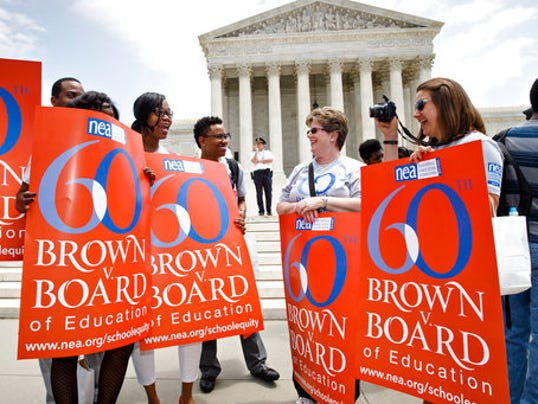
Brown v. Board of Education, one of the most iconic cases in U.S. history, recently celebrated its 64th anniversary, serving as a reminder of battles waged and battles won. It also served, sadly, as a reminder of progress made and progress yet to be achieved.
Yes, while 1954 may seem like a long time ago – and while it’s tempting to assume that
most, if not all, of the problems of that era are behind us – Brown v. Board of Education
remains relevant in the 21st century. It is a landmark civil rights decision and a
referendum on both education and society.
This case, which determined that “separate but equal” was inherently unequal, speaks to what – and who – we value without exclusion and equivocation. Prior to 1954, the
Supreme Court – and, indeed, much of society – failed to validate the histories and
realities of racially oppressed and economically depressed communities. While the
court’s ruling was unanimous and established legal precedent for equality and inclusion,
changing hearts and minds has proved difficult.
Great strides, to be sure, have been made over the last half century and beyond.
However, states, citizens, institutions of higher learning, and colleges of education must
continue to fight for and uphold the values of Brown v. Board of Education. It seems
today that we are in danger of falling backward rather than progressing forward. In my
opinion, recent nominees to our justice system seem to have amnesia or a desire to
have our nation repeat the mistakes of our past. Those who cannot recognize or
articulate the relevance and rightness of that ruling are not worthy of our support,
especially those seeking to serve our system of justice and school boards.
It is wonderful that many U.S. students experience racial and ethnic diversity in their
classrooms, but segregation of opportunity remains. I am grateful to teachers in
Colorado, North Carolina, West Virginia, and around the nation who are banding
together. They are not simply protesting salaries; they are marching in support of
students. Far too many children in rural and urban areas are forced to attend
underfunded schools, which lack necessary resources to ensure that education is both
equitable and excellent. As a result, many students fall behind their peers at a young
age and fail to recover, which can have a lasting impact on their lives and careers and
perpetuate the school-to-prison pipeline.
As public educators, we must stand up for all children. We are called to educate children
regardless of their background, regardless of what deficits they face, and regardless of
what challenges they must overcome. In a world that can be unfair, education must be
fair and equitable. Not everyone has equal access to a great education. Not everyone
has a clear path to success.
Given the odds that many must overcome, we must hold ourselves to a high standard so that the weakest, poorest, and most vulnerable are protected. Our systems of law must continue to guarantee these rights. That applies to our classrooms; that applies to our criminal justice system.
Brown v. Board of Education reminds us of who we were, who we are, and who we
strive to be. It is a moral compass that guides our nation’s promise to every citizen. If we
cannot lend credence to its importance or live out its ideals, what does that say about us
as a people?
Let us all reaffirm our commitment to Brown v. Board of Education. That ruling isn’t
simply about education; it is central to our democracy, and we must never forget it. If we
do, we risk losing everything that we have fought so hard to achieve.
Renee A. Middleton is dean of The Gladys W. & David H. Patton College of Education at Ohio University. She is also chair of the board of trustees for the American Association of Colleges for Teacher Education.
source:cincinnati.



